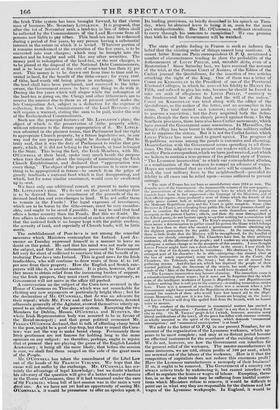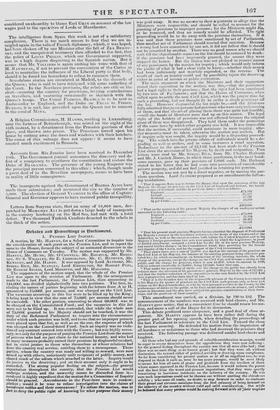The state of public feeling in France is such as
induces the belief that the existing order of things cannot long continue. A recent letter from our Paris correspondent 0. P. Q. mentioned a
number of circumstances tending to show the probability of the dethronement of Louis PHILIP, and, mirabile dictu, even of a Restoration ! Since Saturday last, we have received the account of the trial, at the Parisian Court of Assizes, of the Editor of the Carlist journal the Quotidienne, for the insertion of two articles attacking the right of the King. One of them was a letter of Count DE KERGORLAY to the President of one of the Provincial attacking the right of the King. One of them was a letter of Count DE KERGORLAY to the President of one of the Provincial
Electoral Colleges, in which he avowed his fidelity to Hesiex the
Fifth, and refused to give his vote, because he should be forced to take an oath of allegiance to LOUIS PHILIP, " contrary to the fundamental law of the land, and the will of the nation.' Count DE KERGORLAY was tried along with the editor of the Quotidienne, as the author of the letter, and an accomplice in his crime. The trial excited vast interest; every effort was made to procure a conviction ; but the Jury acquitted both the defen- dants, though the facts were clearly proved against them. • In the Southern provinces, there have also been Ce.rlist movements, which have caused the Government some uneasiness. In Marseilles, the King's effigy has been burnt in the streets, and the military called out to suppress the rioters. But it is not the Carlist faction which Louis PHILIP has most need to guard againt. The progress of Republican notions among the people is extensive and alarming. Dissatisfaction with the Government seems spreading in all direc- tions. On this subject we can present our readers with a letter from another Paris correspondent,which we have just received, and which we believe to contain a true picture of the political state of France. " The Lyonnese insurrection" to which our correspendent alludes, is a combination of the workmen to compel an advance of wages. Hopes are entertained that no violent acts will be committed. In- deed, the vast military force in the neighbourhood—provided its fidelity in all cases can be relied upon—seems sufficient to prevent outrage.
" The state of France has not been so unsatisfactory since 1814 as now. The despotic acts of the Government—the innumerable seizures of the newspapers— the prosecutions of the editors—the arbitrary laws by which all the popular journals have been in fact suppressed—the language of the Ministers, and of 'their official organs—have produced a state of things which the friends of the public peace cannot look at without great anxiety. The rupture between the Moderate Republican party and the Court is quite complete. Sonic (like Du PONT de l'Eure), are retreating from public life, lest their presence should ap- pear to sanction the belief that things can settle themselves under such a monopoly as the present Charter ; others, end these the most distinguished of the Liberal party, do not hesitate openly to say that nothing but aconrulsion will give good government to France. The King's unpopularity is immense ; and there seems a determination to gather round his person the blame which belongs less to him than to those who created a government without obtaining any the slightest guarantees for the public liberties. At the corning elections, there is little doubt that the Ministry will be strengthened, for the handful of electors are already corrupted. The Chambers have lost, by their arbitrary tendencies, all the affections of the people ; and I confess my own opinions have undergone a serious change as to the prospects of this country. I once thought Loris Prime might have run a sheet-anchor in the storm ; I now think his reign or that of his dynasty must be transitory. His obstinacy is, I fear, the strongest part of his character : be is able—intriguing—has created (but at the loss of mach reputation) many servile instruments in the Court, the Chambers, the Tribunals, and the Army ; but these are all around him gathering storms. And this last act, which has deprived the people of their wonted political food, the literature of the streets, has sunk deeper in the minds of the' Men of the Barricades,' than I could have dreamed of.
" The Lyonnese insurrection may become alarming. The immediate cause is a misunderstanding about wages ; but it must not be forgotten that the whole mass of the intelligent workmen of Lyons is Republican ; and Republicanism —believe nothing that is told you to the contrary—is making tremendous strides here. There was a moment of reaction ; there was a moment when a wise Government might have scattered the Republican elements to the winds. They scorned the counsels of those who would have lent honest aid to the illegi- timate Monarchy, and now it is too late. Events are bringing on the boar; and Lours Puriie will drop like spoiled fruit from the branch, with no honest voice to mourn. " The conduct of the Government in commercial matters has excited a general burst of indignation : Freedom of Trade' is a cry that is rushing from city to city. On M. THIERS' projk de loi (which, however, contains many liberal modifications of the laws), all the press has fallen with extreme violence, as wholly unsuited to the spirit of the times, which demands cmumercial emancipation ;' and 'commercial emancipation' is at hand." We refer to the letter of 0. P. Q. in our present Number, for an account of the organization of the Lyonnese workmen, which ap- pears to be most complete; and may at no-distant period become an effectual instrument for the overthrow of the existing dynasty. We do not, however, see how the Government can interfere for the present relief of the workmen. The master-manufacturern in some instances, we are told, obtain profits of 300 per cent., which are screwed out of the labour of the workmen. How is it that the competition of capitalists does not reduce this enormous profit? Have the Lyonnese manufacturers a monopoly of their business? If so, it ought to be removed. The Government of a country can always relieve trade by unfettering it, but cannot interfere with effect to regulate the hours or wages of labour. Excepting, there- fore, in so far as their trade may be suffering from hurtful restric- tions which Ministers refuse to remove, it would be difficult to point out in what way they are responsible for the distress and low wages of the Lyonnese workpeople. In England, it would be considered an absurdity to blame Earl GREY on account of the low wages paid to the opet Wives of Leeds or Manchester.





















 Previous page
Previous page